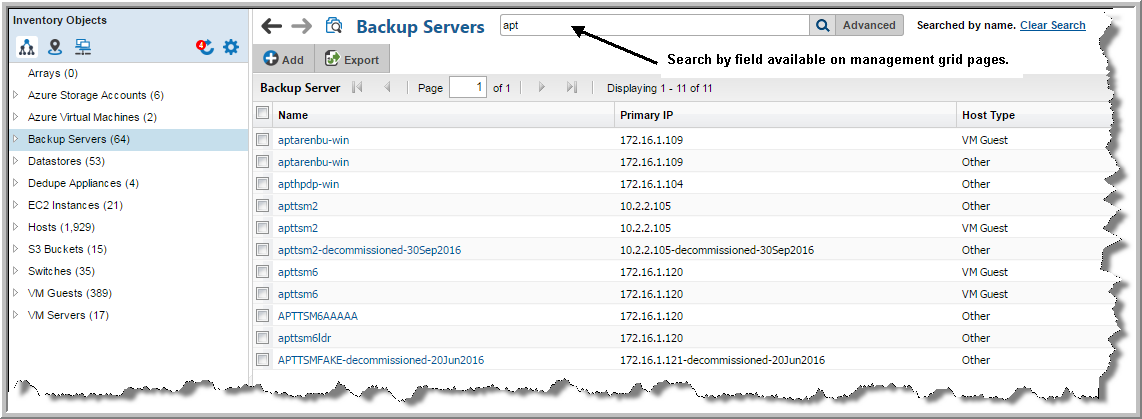Navigating with Search
Search enables you to discover, navigate to, and perform operations on a number of elements within StorageConsole. All objects within the Inventory are discoverable by Search. Reports, templates and dashboards can be found and generated on-demand using Search. Data collectors and their policies can be quickly located, providing immediate access for analysis or updating. See
Valid Entries for Search.
Additional filtering is available on those elements displayed in management grids:
To search StorageConsole
Enter a value in the
Search field. You can select a filter from the drop down menu to further narrow the scope of your results. As you type, the first 10 potential matches are displayed. These are string matches. You can also click
All Results in the match list to go directly to the search results. See
Refining Your Search Results.
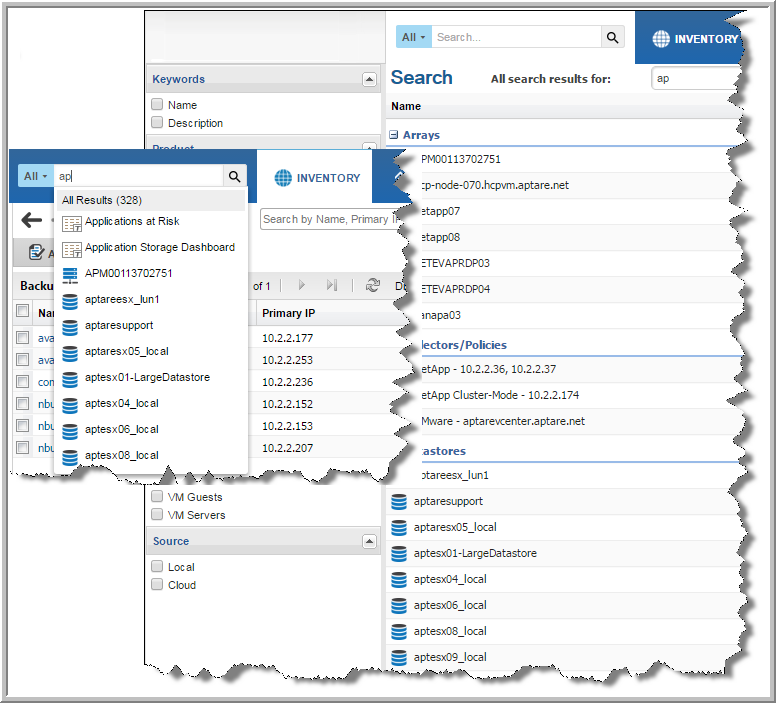
Searching for... | Search Results... |
Reports and Dashboards | For reports and templates, search crawls the report/template name, short and long description. On the Search Results page, click the link in the Source Location column to navigate to the source report or template. You can edit or customize the report if applicable. Double-click a template to display the scope selector. This allows you to set the parameters before running it. Double-click a report or dashboard to run it. Click Details to toggle on the view panel to read a long description for a report or template. (This is only available for Backup Manager and Capacity Manager). |
Inventory Objects | For Inventory objects, search crawls object name. For Hosts, search also crawls primary IP address. For VM Servers, search also crawls Cluster name. Note: In Search, Primary IP address requires the full address and does not support a partial entry. Search by, the page-level operation, supports a partial entry. On the Search Results page, if you locate the required inventory object, you can double click it and go directly to its specific Reports within the Inventory. |
Data Collectors and Policies | For Data Collectors, search crawls the collector name. For collector policies, search crawls the policy name. Note: The policy name is system generated. The name is derived from a combination of vendor name and in most cases, a server IP address. On the Search Results page, if you locate the Data Collector or policy you’re interested in, double click it to go directly to the Collectors page with the result selected. |
Search by
Because StorageConsole collects and presents such a large volume of data, search results often require additional filtering. On the management grids, Search by, a page-level operation, provides the ability to further refine the results of your Search. Management grids include:
• Inventory list view
• Data Collection collectors view
• Users and User Groups
To search at the page-level
1. Click a management grid.
Advanced Search
Advanced Search is another, more granular level of filtering available on the management grids. This dynamic search uses columns displayed in the view as the search criteria along with the use of operators such as equals or does not contain. You can also choose to use all or any of the search criteria. For example, if you select the Hosts in the Inventory list view, and the columns shown are:
• Host Name
• Creation Date
• Host Type
• Host Description
• Host Display Name
• Primary IP
• IP Address
• Host ID
Those are the same fields displayed in the Advanced Search dialog. The fields displayed on the Advanced Search dialog are tied to your column selection and dynamically change based on your selection and column settings. As you modify the display, the Advanced Search dialog also changes. This means, if there’s a column available to select, you can search on it.
Using Operators in Advanced Search
Operators enable you to refine the search criteria in
Advanced Search in combination with your search entries. Build the query using any or all of your conditions.
All returns only results with all conditions met.
Any returns only results with at least one match.
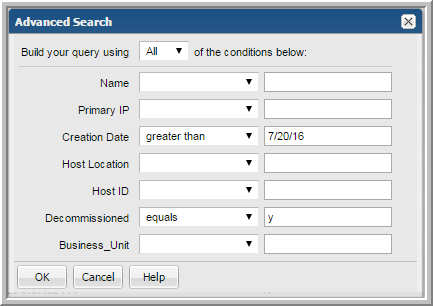
Advanced Search Examples
Because the Advanced Search is dynamic and tied to your column selection, you can search on any available column. As an example, let’s say you want to find all hosts on a LINUX platform that were created after July 20, 2016.
2. Select Hosts.
4. Click
Advanced and the selections should be:
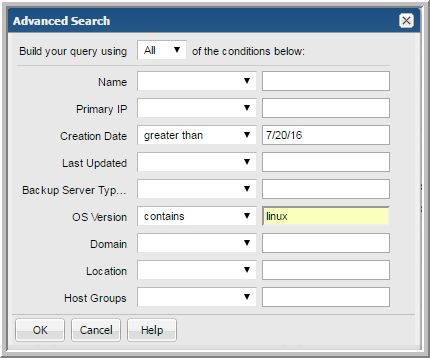
Advanced search is useful for discovering what’s been left out of a criteria set. For example, find backup servers that have not been assigned to a Business Unit.
1. Choose the Default Hierarchy (object, subsystem) in the Inventory.
2. Select Backup Servers.
3. Choose the Business Unit column to display in the grid.
4. Click
Advanced and the selection should be:
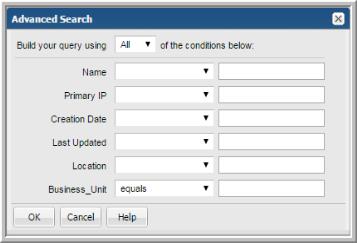
You set the value as blank, but you must select an operator. In the example, the operator is equals.
Select from the following operators:
Operator | Description |
equals | The search result value is equal to the value entered. The entry can be a number, date, string or a blank. The match is case insensitive. Date entry format is based on your locale and the settings in your profile. To set the search value as a blank, you must select an operator. |
not equal | The search result value is not equal to the value entered. The entry can be a number, date, string or a blank. The match is case insensitive. Date entry format is based on your locale and the settings in your profile. To set the search value as a blank, you must select an operator. |
greater than | The search result value is greater than the value entered. The entry can be a number, date, string or a blank. The match is case insensitive. Date entry format is based on your locale and the settings in your profile. To set the search value as a blank, you must select an operator. |
less than | The search result value is less than the value entered. The entry can be a number, date, string or a blank. The match is case insensitive. Date entry format is based on your locale and the settings in your profile. To set the search value as a blank, you must select an operator. |
greater than or equal to | The search result value is greater than or equal to the value entered. The entry can be a number, date, string or a blank. The match is case insensitive. Date entry format is based on your locale and the settings in your profile. To set the search value as a blank, you must select an operator. |
less than or equal to | The search result value is smaller than or equal to the value entered. The entry can be a number, date, string or a blank. The match is case insensitive. Date entry format is based on your locale and the settings in your profile. To set the search value as a blank, you must select an operator. |
contains | The value of the entry is present anywhere in the value of the search result. Example: If the entry is “rattle” and the value entered is “rat” or “at” will be displayed. The entry can be a number, date, string or a blank. The match is case insensitive. Date entry format is based on your locale and the settings in your profile. To set the search value as a blank, you must select an operator. |
does not contain | The value entered is not present anywhere in the value of the search result. The entry can be a number, date, string or a blank. The match is case insensitive. Date entry format is based on your locale and the settings in your profile. To set the search value as a blank, you must select an operator. |
is a member of | The search result value is equal to any of the comma-separated values entered. This string of values is the equivalent to a multi-select. There is no limit to the number of characters that can be entered for this value. The entry can be numbers and strings. To set the search value as a blank, you must select an operator. |
is not a member of | The search result value is not equal to any of the comma-separated values entered. This string of values is the equivalent to a multi-select. There is no limit to the number of characters that can be entered for this value. The entry can be numbers and strings. To set the search value as a blank, you must select an operator. |
matches regular expression | The search result value matches the regular expression entered. The entry can only be a string. See also: http://docs.oracle.com/javase/7/docs/api/java/util/regex/Pattern.html |
does not match regular expression | The search result value does not match the regular expression entered. The entry can only be a string. See also: http://docs.oracle.com/javase/7/docs/api/java/util/regex/Pattern.html |


